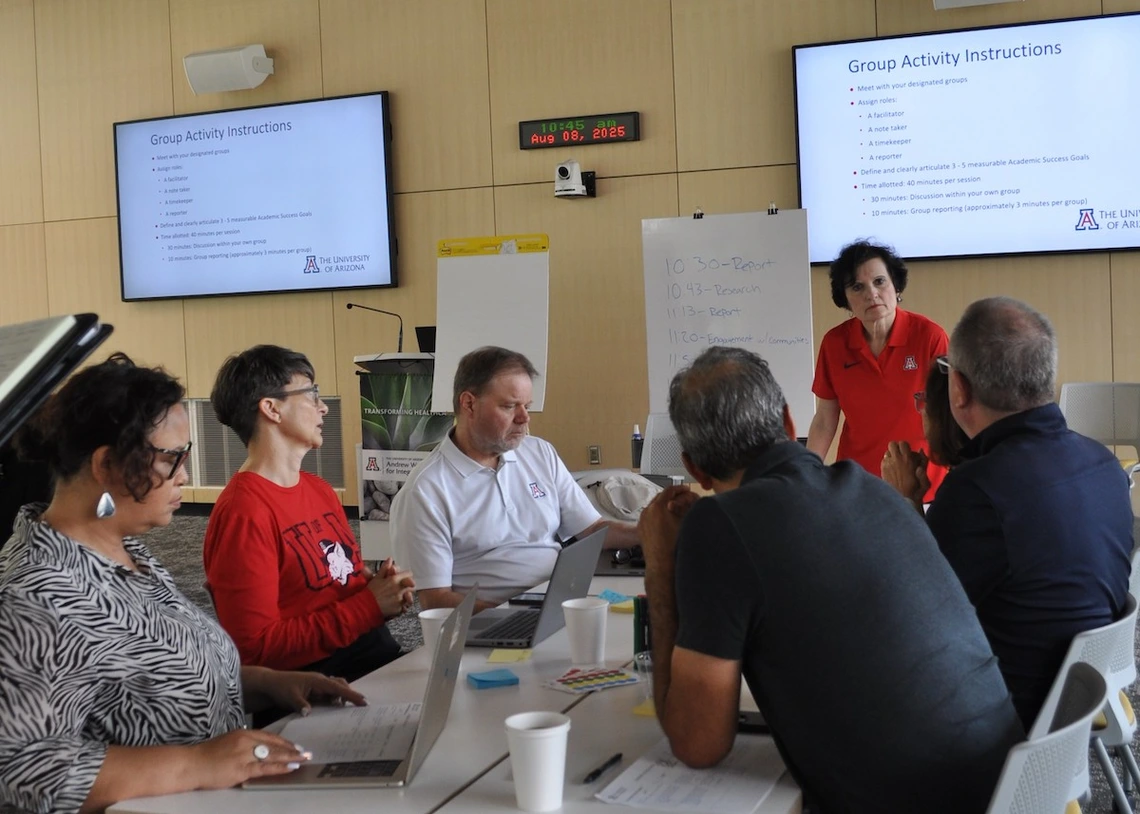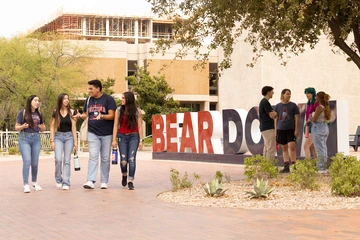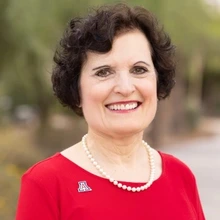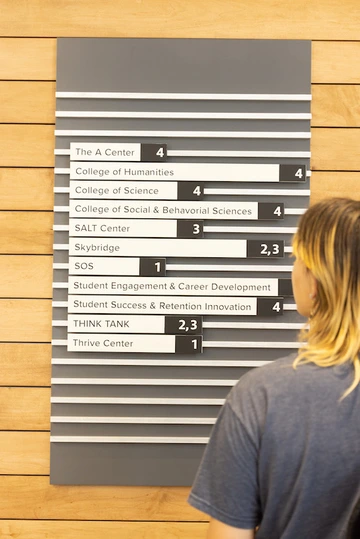Q&A: Provost Prelock shares the biggest takeaways from her Campus Conversations

Provost Patricia Prelock leads a group activity at the Council of Deans meeting on Aug. 8. Prelock says open dialogue with administrators and faculty is a key component of student success.
Since she began at the university, Provost and Chief Academic Officer Patricia Prelock has stressed the importance of listening and open dialogue. Over the past several months, she has illustrated that commitment with a series of Campus Conversations with hundreds of students, faculty, staff, community members and more. From supporting students' academic, financial and mental well-being to making sure employees have the support they need to maximize their impact, Prelock shared her biggest takeaways with Lo Que Pasa.
You spoke with more than 420 people across campus and beyond. Can you share a specific moment or piece of feedback from those conversations that surprised you or stayed with you?
I was surprised by how consistent the themes were across the different stakeholder groups.
All stakeholder groups felt we should develop a one-stop shop for students where all their questions can be addressed, from academic needs – such as internships, research opportunities, tutoring support and advising – to answering questions about financial aid, transfer services, joining clubs, health and wellness.
With our Student Success District, I learned the importance of coordinating and communicating about those services in an accessible and student-centered way. It also caused me to rethink how our support services are organized to break down silos and align resources. We need a more coordinated, consistent and supportive throughline that guides students seamlessly from their prospective student experience through enrollment and beyond.

Prelock says she would like to see a more "coordinated, consistent and supportive throughline" of the services offered to students through the Student Success District.
For example, professional advising is not implemented consistently across campus. Caseloads are high, training is lacking and compensation can limit the ability to recruit and retain experienced and highly trained professional advisors.
You've talked about strengthening the student experience, especially in the first two years of their Wildcat journey. What did students share about those early experiences, and how is that shaping support through advising and student services?
Students offered very constructive feedback. They emphasized the need for stronger tools to plan their academic journey such as integrated activity calendars, degree-planning resources and more in-person summer courses. They also stressed the importance of consistent career preparation and financial wellness and scholarship support, noting that graduate students in particular face challenges with food insecurity and housing.
Many students highlighted the importance of belonging to their success, saying designated student spaces are critical anchors. Graduate, international, first-generation, and online students called for opportunities to build community with their peers, connection with campus life, and the chance to have a stronger voice in decisions that affect them.
On the academic side, students wanted the University 101 and 301 courses to feel more practical and engaging. They suggested clearer goals, more content on financial literacy, and exploration of majors, along with a stronger emphasis on career readiness and professional development.

Patricia Prelock
Faculty and staff play a central role in student success. From what you heard, what do advisors, instructors and staff need most right now to make the biggest impact for students?
Faculty noted the importance of students arriving better prepared with foundational skills such as note-taking and time management. They also expressed a desire for more streamlined university software systems, since navigating multiple platforms can be confusing and time-consuming. Tenure-track faculty said they want to be more engaged in undergraduate education and teaching.
Across the board, faculty and staff emphasized the need for a stronger sense of belonging and community for themselves and students as well as greater focus on preparing students for real-world careers. They also highlighted the importance of stronger advising, onboarding and experiential learning opportunities for online students.
What did you learn from alumni, donors and community partners about providing students the skills they need to thrive in their careers and lives after graduation?

A common theme in the conversations with stakeholders was the need for strong academic advising support for students.
Community members emphasized the value of high-impact experiences like research, study abroad and community service, as well as strong mentoring, career planning and advising for all students. They also stressed the importance of supporting students' well-being and mental health and of building connections beyond campus.
They shared the need for clear and consistent communication about changes that affect students, as well as more opportunities for professional development to prepare them for future careers. They pointed to the importance of building strong partnerships with community colleges and K–12 schools to prepare students for success at the University of Arizona.
How is the input you received helping shape the academic success goals you are developing with your team? What are the first steps in putting this feedback into action?
The input has been instrumental in shaping both the academic success goals and our first steps toward achieving them.
For example, we created an Academic Advising Task Force to enhance our approach to advising that will bring more consistency across colleges and coordinate training for all advisors. We also launched an Academic Advising Salary Review Task Force to examine compensation and resources needed for professional advisors. Additionally, we are examining the possible avenues to address stipends increases for graduate students and have launched two new funding opportunities through the Provost's Investment Fund. These are just some of the programs that are underway.
We know that student, employee and community experiences will evolve as these efforts move forward. I am looking forward to another round of conversations, likely in the summer and fall of 2026, where stakeholders can continue to share their thoughts in a small group setting.

